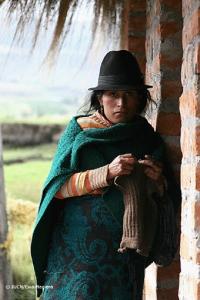Adapting to climate change in the Andes
The Andean páramos — high-altitude grasslands running through Peru, Ecuador, Colombia and Venezuela — are critical to millions of rural and urban people. They support livelihoods, provide habitat for species found nowhere else and are important for cultural identity.
The páramos is the largest supplier of water in northern Andean countries. Almost all river systems in Venezuela, Colombia, Ecuador and northern Peru originate in the páramo. Irrigation, drinking water and hydroelectricity of these countries depend largely on the water regulation capacity of the páramos.
But this ecosystem is vulnerable to climate change. And climate is not the only change it is facing. Human activity including agriculture, livestock grazing, burning, mining, inadequate water management and urban expansion all pose serious risks to its integrity and to the services it provides.
Concern and uncertainty about the social and environmental impacts that climate change can pose to the páramos of the region have led to a growing interest from civil society, increasing political debate and numerous scientific studies.
IUCN’s Regional Office for South America, together with partner organisations, recently carried out a study: Andean Páramos: What do we know? The state of knowledge of climate change impacts in the Andean páramo ecosystem.
The study was part of an IUCN project Communities of the Páramo: Strengthening Capacities and Coordination for Climate-Change to Adapt to the effect of climate change, which focuses on social conditions and sustainable management of the paramo ecosystem in Colombia, Ecuador and Peru.
The project promotes learning, collaboration and the capacity of local organisations and decision-makers to address climate change adaptation and help the communities, mostly indigenous people, living in and around the páramos.
The study gathered and synthesised existing scientific knowledge on the páramos, with a focus on the effects of climate change. Its findings will be fed to the public, decision makers and the scientific community and will guide the activities of the ‘Communities’ project.
‘Communities of the Páramos’ is being implemented by the Mountain Institute (Peru), Fundación Tropenbos and Instituto Alexander Von Humboldt (Colombia), Ecopar and Corporación Randi Randi (Ecuador) and coordinated by IUCN’s South America office with the support of the Ministry for Foreign Affairs of Finland.
For more information contact: marcos.cerra@iucn.org







